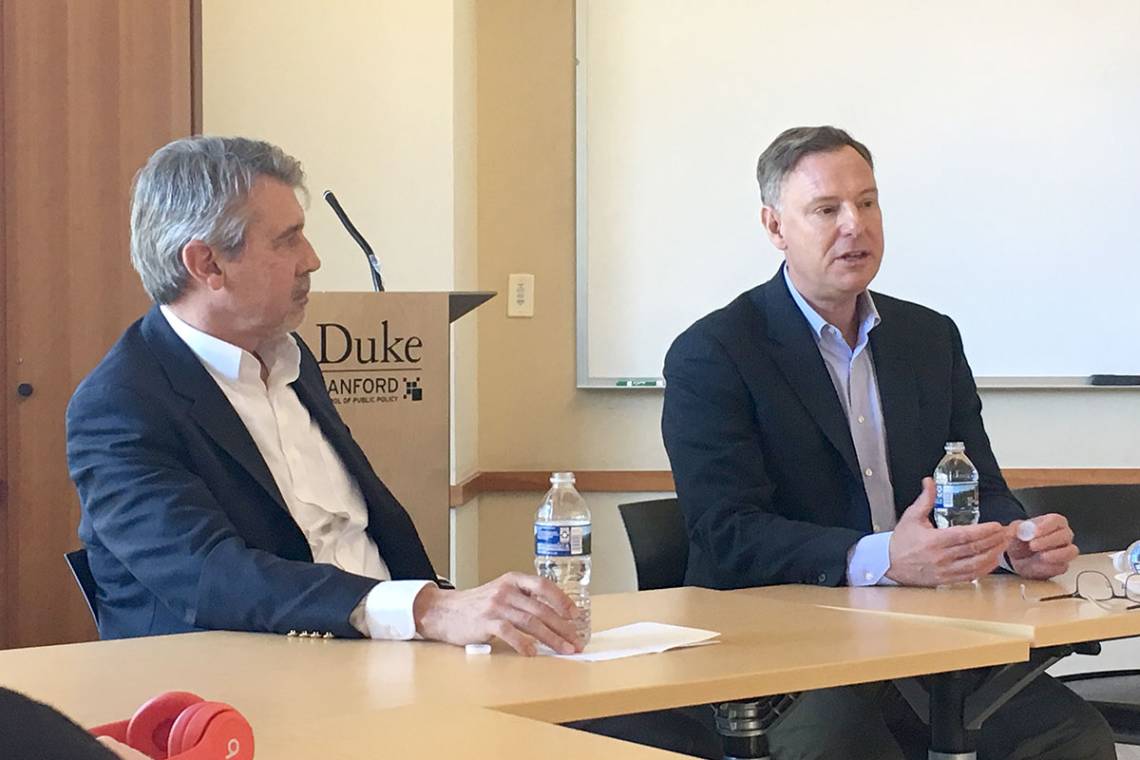US Rep. Scott Peters on Whether the New Democratic Majority Can Unify the Country

Duke University boasts seven alums currently serving in the U.S. Congress. On February 18, Duke University welcomed its third of the 2018-2019 academic year: Scott Peters ’80, who spoke to Duke students at the Sanford School of Public Policy.
The son of a Lutheran minister, Peters visited Washington, DC, for the first time when he was eight, and six years later volunteered for George McGovern’s unsuccessful 1972 presidential campaign. While at Duke he studied economics and political science. To help earn money, he cleaned the Psychology Department’s pigeon cages for $2.55 an hour.
Perhaps that’s one way to prepare for a congressional career.
A vice chair of the 101-member New Democrat caucus, Peters has positioned himself as a problem-solver in the House of Representatives, keen on building bridges between his party and Republicans to effect meaningful legislative improvements.
But he never intended to be a congressman for life. He was elected six years ago at the age of 54 after serving for eight years in the San Diego City Council. He seriously considered running for mayor of San Diego, but quashed that thinking after the 2018 midterm elections.
“Now that Democrats are in the majority,” he said, “there’s a lot more I can do here.”
He shared with the students some of the nuances of passing legislation. Some bills are brought to the House or Senate floor to embarrass the minority party—to force them to support something politically unpalatable. For example, as a former environmental lawyer, he likes the enthusiasm around the recently proposed Green New Deal. “The environment is like a patient in the sick bay,” he said “and the doctors are arguing about how to treat it.” But if Senator Majority Leader Mitch McConnell (R-KY) forces a Senate vote on its elements, Democrats will be vulnerable to scrutiny.
“Republicans are claiming this New Deal will mean the end of cars, planes and cows,” Peters said. “Of course, that’s not true. But politically it could drive a wedge in our party.
“The key to doing radical stuff is doing it without people thinking it’s radical.”
Peters spoke bluntly about President Trump’s recent National Emergency declaration, which will reallocate unappropriated funds toward building more walls along the southern border. In the district Peters represents, “the border with Mexico is not a threat; it’s an opportunity. It’s part of San Diego’s economy and culture.”
The border security issue is an example of the challenges of legislating, Peters said. Last year Reps. Will Hurd (R-TX) and Pete Aguilar (D-CA) introduced a bipartisan bill called the Uniting and Securing America Act. It would have provided Dreamers who have lived in the United States for at least four years, including Deferred Action for Childhood Arrivals (DACA) recipients, with the opportunity to earn permanent legal status, and it also would have strengthened U.S. border security through the use of technology, investments in ports of entry, and the development of a comprehensive southern border strategy.
216 House members supported the bill. But House Speaker Paul Ryan refused to bring it to a vote, as doing so would run the risk of dividing Republican members.
When asked why Speaker Nancy Pelosi isn’t pushing for that bill today, Peters noted that now there are different issues at play. Now that they are in the majority, Democrats want to fulfill a long-held desire to pass a “clean” Dreamers bill, without any other attachments.
“The Hurd bill could still get a vote,” Peters acknowledged. “But the calculus has changed. Speaker Pelosi lost her majority eight years ago. She doesn’t want to put forth legislation that could threaten her majority again.”
He also went into great detail on policies governing the budget and taxes, health care, and U.S. Immigration and Customs Enforcement. On every issue, he emphasized a focus on the facts, a sense of right and wrong, and a desire to find common ground with those who might disagree.
He was asked which Democratic candidates for president appeals to him. “Our country is desperate for unity,” he said. “What people want is a government that works, and someone who can propose solutions that make sense.”
His talk was sponsored by POLIS: Duke’s Center for Political Leadership, Innovation, and Service, and was moderated by POLIS Director Fritz Mayer.